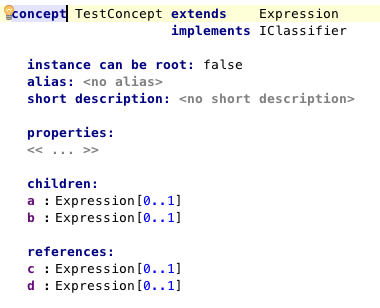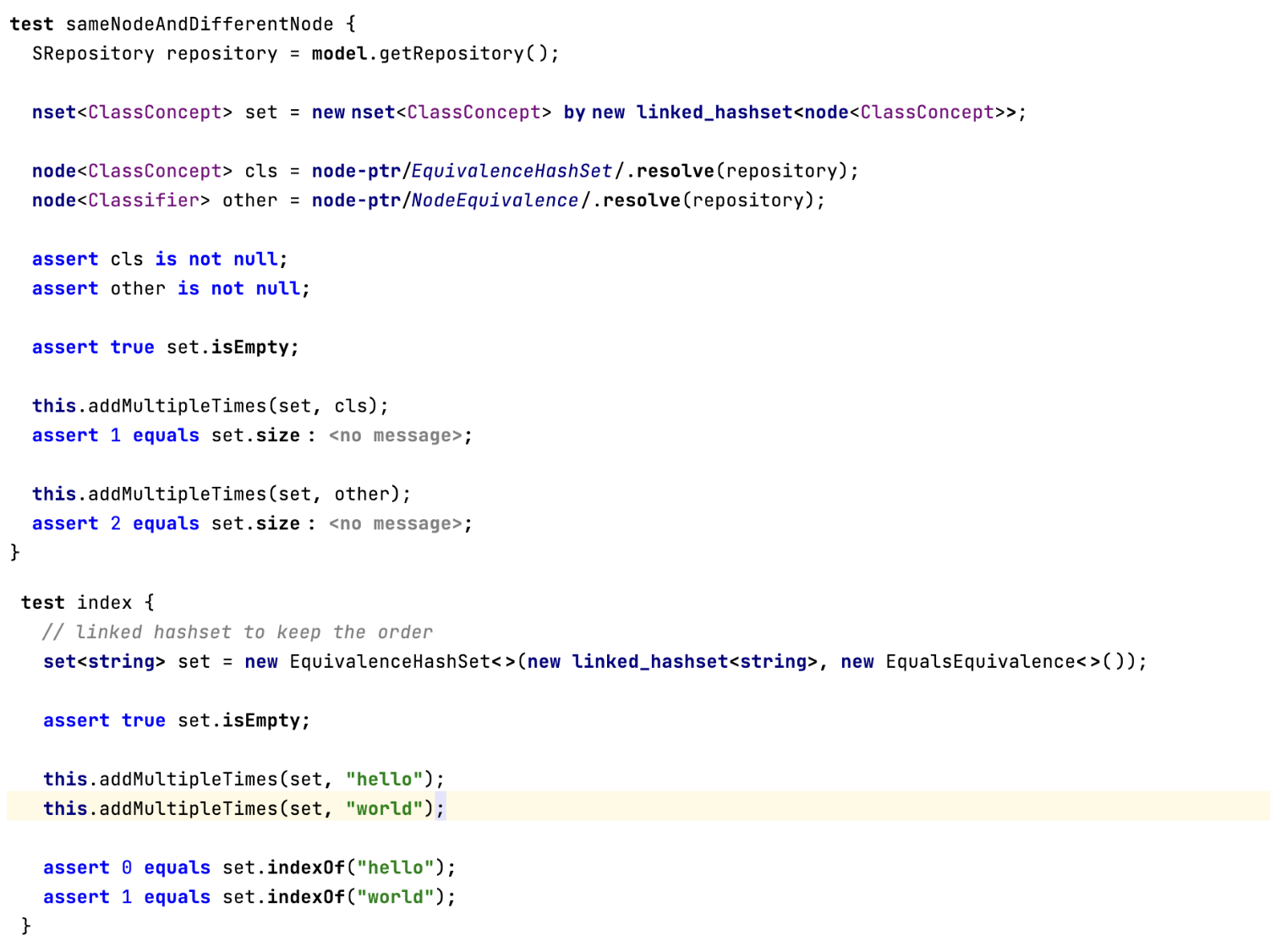Language extensions¶
This page lists some languages that extend existing MPS' languages. None of them are essential for working with MPS but can rather be convenient for special use cases.
Dataflow¶
com.mbeddr.mpsutil.dataflow
MPS-DF is a dataflow extension for MPS. MPS partly includes the code of this project. Please visit the following page for more information:
An Extensible Framework for Variable-precision Dataflow Analyses in MPS | Tamás Szabó ⧉
Default Values for Properties¶
com.mbeddr.mpsutil.propertydefault
This language allows setting a default value for properties when you initialize them. The default value can be set by invoking the code completion on an existing property constraint inside the concept constraints of a concept and using one of the completion items with the "default" suffix:
Extension Class¶
com.mbeddr.mpsutil.extensionclass
MPS already provides a language for defining extension methods ⧉, for example, methods to be called on an object without being part of the Object's class. This language extends this mechanism to provide all static methods of a class as extension methods. You can invoke them on the type of the method's first parameter.
Import the language and create a new ExtensionClass ⧉ root node. Reference the Java class containing the static methods. Add method annotations to overwrite parameter names so that they're more elaborate than "p0" or "p2".
As a starting point, create a dependency to the model com.mbeddr.mpsutil.extensionclass.annotation.apache.commons.lang3, which provides extension methods with valuable parameter names for Apache Commons StringUtils, ObjectUtils, and StringEscapeUtils.
Language Plugin Extensions¶
com.mbeddr.mpsutil.lang.plugin.extensions
This language contains extensions for jetbrains.mps.lang.plugin. It mainly adds support for adding actions not only at a specific position but also supports the anchors first, last, before, and after. Example:
add to NewProjectOrModuleGroup after position NewProject
Parameterized Menu¶
com.mbeddr.mpsutil.parameterizedMenu
This language is an extension of the parameterized transformation language part. When used as a menu part of it, it allows iterating over the parameter object (parameterizable parameterized menu part) or creating a dynamic submenu based on the parameter object (parameterized submenu).
For completion styling and item priorities, use completion styling ⧉ instead.
Resources¶
com.mbeddr.mpsutil.resources
This language extends jetbrains.mps.lang.resources by providing more customizations. CircleCustomizable adds support for drawing the circle with a different thickness. The class TextCustomizable ⧉ supports specifying the font style (plain, bold, italic), font family, and offsets for the text.
Suppress Warning¶
com.mbeddr.mpsutil.suppresswarning
This language allows attaching an annotation to nodes to deactivate all or specific type system warnings by invoking the intention Toggle Suppress Warnings. You can suppress different kinds of warnings:
- all ⧉: Suppress all warnings.
In com.mbeddr.core.modules, two more data flow-related kinds exist:
- Liveness: Suppress dataflow liveness warnings.
- Dataflow: Suppress dataflow warnings.
Type System Trace¶
com.mbeddr.mpsutil.typesystem.trace
This language doesn't work anymore.
This language modifies the different type system concepts, such as comparison rules or non-type system rules to collect information about the runtime execution time. To use it, place an instance of TraceTypesystem ⧉ into a type-system aspect to include the generator of this language and set the enabled flag to true. The model contains a new action Benchmark Typesystem that opens the Type System Performance Data tool. It shows the collected information.
XML Fix¶
com.mbeddr.mpsutil.xml.fix
This language contains fixes for the XML language. It escapes XMl values ⧉ for XML 1.0/1.1.
Unique Names¶
com.mbeddr.mpsutil.uniquenames
MPS references all nodes by their id, not their name. Still, humans see only the name, which might be ambiguous. Activate the unique names hint in the MPS Preferences → Editor Hints. It shows as much of the full qualified name as required, rendering it unique.
Example concept:
Example Base Language:
Collections¶
A new language com.mbeddr.mpsutil.collections was added that adds support for a set type nset that use nodes as the values of the set. Equivalence of nodes is checked structurally. The hash code calculation is done for all properties and children and the first level of references. The runtime solution also contains a more general class EquivalenceHashSet to implement hash sets with arbitrary equals and hashcode methods. nset<> is also compatible with set




